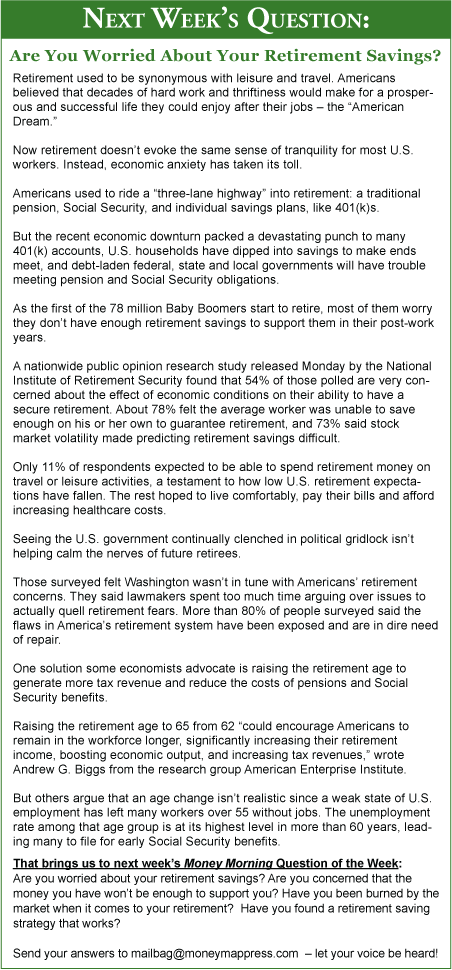Today, March 9, the U.S bull market in stocks celebrates its second birthday.
But what everyone really wants to know is this: A year from now, will we be celebrating again - or will we be trying to outrun the bear?
So far, 2011 is delivering on that bull market promise. February represented the third straight month of U.S. stock-market gains.
All three major indices are up more than 5% so far this year. The Standard & Poor's 500 Index rose 3.02% in February and 2.26% in January. In fact, even with the damage that the Middle East crisis inflicted on stock prices at the end of last month, the S&P 500 and Dow Jones Industrial Average each enjoyed their strongest February showing since 1998.
This early year performance is a good market signal, technically speaking. The S&P 500 has finished higher in January and February 30 times since 1928, according to a recent Bespoke Investment Group report. The average gain for the rest of the year in those 30 years has been 7.4%, with the median change of 10.97%. The index has traded higher for the rest of the year in 26 of those 30 years, or 87% of the time.
Although U.S. stocks have zoomed by nearly 100% from the bear-market lows of March 2009, there's enough fuel to push the bull higher, according to research from Bank of America - Merrill Lynch (NYSE: BAC). The current stock surge right now ranks No. 10 on the list of the Top 10 U.S. bull markets of all time.
And these gains have occurred in the face of continued economic and political uncertainty - meaning U.S. stocks notched these gains while climbing the proverbial "wall of worry." Commodities continue to soar, Middle East unrest is driving up oil prices, unemployment remains high, the U.S. housing market is at bottom and mounting U.S. deficits have analysts worried that the federal government is maxing out the national credit card.
So far, stock prices have proven resilient to Middle East turmoil by dipping only slightly - and then rebounding higher.

But stock-market bears continue to argue that U.S. stocks are overdue for a correction, and that the stock market can't shrug off the global uncertainty for much longer. While many investors have enjoyed their two-year ride on the bull, others are worried and just want to avoid being mauled if it does indeed morph into a bear.
Many bears argue that the easy-money policies that aided the U.S. rebound from the global financial crisis have been the key catalyst for the current bull market - meaning stock prices won't be able to continue their advance as stimulative measures wind down.
However, Money Morning Contributing Writer Jon D. Markman says that he just can't agree. Markman says that there are too many market leaders - including Exxon Mobil Corp. (NYSE: XOM), Caterpillar Inc. (NYSE: CAT) and The Walt Disney Co. (NYSE: DIS) - behind the Dow's surge for this bull run to end.
"There's an argument to be made that it won't last longer than it takes U.S. Federal Reserve Chairman Ben S. Bernanke to end QE2," Markman said. "But in my view - which is based on historical precedent, intuition and experience - it's hard to bet against this bull run."
This prompted last week's Money Morning "Question of the Week": Are you betting on the bull market? Do you believe this bull run can continue? If so, for how long? What stocks and sectors do you expect will perform the best? Or are you in the bear camp, and getting away from U.S. stocks - for fear that a correction is overdue, and even imminent?
The following reader responses show some skepticism over markets continuing to climb.

Pop Goes the Market Bubble
I expect that the market will continue to inflate until it pops. As I see it, the stock market is a leaky bubble that is currently rising because the Fed is inflating it. If the Fed were to stop inflating (QE2 and ultra-low interest rates), it would deflate and collapse. However, if they continue to inflate, as Bernanke has indicated he will, then at some point it will burst, generating a catastrophic collapse. The real question is when this will happen, and I have no expectation of being able to guess, because the bursting of bubbles is usually dependent on some unforeseeable outside trigger. But if you wait for the trigger to try to get into position, you will be too late.
By protecting myself against such a collapse I have missed a lot of growth in the markets over the last couple of years (not all, but a lot). And there could be several more months of growth for all I know. But I am absolutely convinced that this is not an honest stock market featuring healthy growth, and I am sure that when it starts down the decline will be a lot faster than the rise has been. Should the Fed stop their inflationary policies, then the decline might be somewhat slower, but I think that the probability is low. Instead, absent some outside event that panics the markets, I would guess that sooner or later bond holders are going to watch inflation continue to rise and decide that government debt at current interest rates is a bad investment, and the move to the exits could all happen in a rush.
- Gordon F.
Food Prices to Fuel Markets
In my view, the market will be fueled by food prices. Yes, they are going up, but the farmers are getting paid more for their crops. Farmers generally spend all their money as soon as they get it, very little savings. And, money made from crops multiplies seven times in the economy!
China is in the midst of a major 200-year drought. They produce more wheat than any other country. They bought some last year and are on track to buy lots more this year. They have the money to out-bid any other buyers. I am betting corn and wheat prices double, or triple, this year. The farmers will have lots of money to spend and the economy will do just fine - until next spring. Then watch out: I will be a grizzly bear then as inflation goes wild.
- Doris K.
Bull Market = Time for Suspicion
I'm trying to look at 2011 with a contrarian view, seeing money piling into the markets as a time of suspicion while balancing a history lesson regarding the third year of a presidential cycle.
I'll be watching for corrections in certain sectors while looking for a modest upside to the market as a whole. I will continue to keep my eye on precious metals as I believe the general momentum will be up as the federal government, the Federal Reserve, and the U.S. Treasury continue to play games with the U.S. currency.
- David P.
Crash is Coming
One has to be pessimistic about the future for the U.S. stock market given the load of debt that is on the U.S. credit card. With the insane federal policies that have prevailed for several decades one has little justification for being bullish about the stock market. If the Republicans in the House can hold the line on fiscal responsibility, reduce government spending, and most importantly slash government regulation, the crash may be less catastrophic than it will be if the Obama administration policies prevail for years to come.
Unfortunately, if they do the right thing it may in fact occur sooner. The 2011 - 2012 recession most likely will be unprecedented in world history.
- Ron C.
Who's Bullish?
Bullish? You've got to be nuts. The nation is bankrupt. Our political leaders are a pack of morons. The Federal Reserve is run by a bunch of pathetic incompetents. Meanwhile, two wars are daily draining billions of dollars we don't have and we are borrowing from all over the world, bankrupting everyone else as well.
Yeah, sure I'm bearish; isn't everyone?
- Jose J.
Be sure to answer next week's question: Are you worried about your retirement savings? Are you concerned that the money you have won't be enough to support you? Have you been burned by the market when it comes to your retirement? Have you found a retirement saving strategy that works?
Send your answers to [email protected].!
Is there a topic you want to see covered as a "Question of the Week" feature? Then let us know by e-mailing Money Morning at [email protected]. Make sure to reference "question of the week suggestion" in the subject line. We reserve the right to edit responses for length, grammar and clarity.
Thanks to everyone who took the time to participate - via e-mail or by posting their comments directly on the Money Morning Web site.]
News and Related Story Links:
- The Wall Street Journal:
BAML Technicians: Bull Market Tested, But Still on Track.
- Bespoke Investment Group:
March Seasonality
- MarketWatch:
Ominous Parallels
- Money Morning:
Exxon Mobil Corp. (NYSE: XOM) and Other Large-Cap Leaders Will Continue to Motivate the Market
- Money Morning News Archive:
Question of the Week Feature


